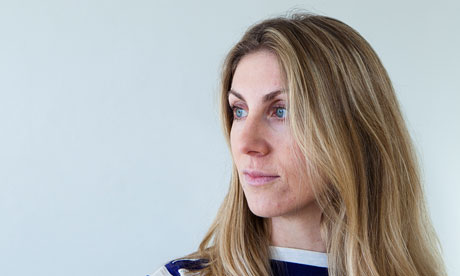
I was out walking the dog in the morning sunshine when the contractions became more noticeable. Just the twinges of early labour, I convinced myself, thinking back to similar pains in my first pregnancy. It was only on my return to my parents' house, when they became faster, more pronounced and powerful, that I made two calls: one to the midwife, who promised to arrive within the hour; the other, as a precaution, to my 90-year-old grandmother who lives next door.
I'd planned a home birth and had no reason to think my labour would be an eventful one. My first birth had been in hospital and lasted for 36 hours – I thought this one would be a bit quicker, and felt relaxed about it.
But by the time I got back to the house, I knew things were happening much more quickly than I expected. I recall fumbling with a few of the homeopathic remedies I'd been prescribed and thinking that, despite the increasing tightness across my swollen stomach, I should hold out for a little longer before reaching for the pain-relieving Tens machine. As the pains increased and my movements became more frantic, I realised my labour was becoming fully established.
The next 20 minutes were pure adrenaline. I leaned against the window, looking up the road, forehead pressed against the backs of my hands, desperately willing the midwife to appear. My heart leapt at the sight of a car; only to sink when I knew it wasn't the longed-for assistance. My husband, Keval, had been calm throughout, rubbing my back and whispering reassurance. But as the contractions shifted up a gear, I remember frantically peeling the backing from the pads of the Tens machine, screaming at him that it was too late.
Then my grandmother turned up and instantly understood the turn of events. She could see the makeshift labour ward Keval and I had set up in the dining room – table and chairs cleared to the side; waterproof sheeting to protect the carpet; folded towels teetering in a pile. She saw me – by now kneeling, arms cradled around the piano stool – and proceeded to scrub clean her hands. She must have read the signs, and returned, sleeves rolled to her elbows. Within seconds, my waters broke and the previously manageable twinges transformed into fast-flowing contractions.
At that point it still hadn't crossed my mind that my grandmother would deliver my baby. In focusing so intently on the midwife, I forgot that we already had one in the house: my grandmother. She was more than qualified for the job. She had trained as a midwife in Edinburgh in the early 1940s and gone on to deliver more than 1,000 babies: during the war, she once delivered seven babies in one night shift.
At 90, she is still a formidable presence. Even though she hadn't delivered a baby for 50 years, I felt completely confident about her stepping in. As soon as she placed her hand on my shoulder, my anxiety melted away.
By the time it was clear that my daughter, Carys, was about to be delivered by her great-grandmother, I was lying on the dining room floor. My nan instructed Keval to support my head and back while she knelt at my feet, guiding me when to push and when to hold back the urges that were overtaking my body. I never once considered that her age or her artificial hips might prevent her crouching on the floor; nor that she might have lost the knack since she last delivered a baby 50 years ago.
Aside from the searing pain, my enduring memory is of a very controlled birth. My nan afterwards brushed off the significance of her achievement: it was almost as if she was stepping back into a younger version of herself, one where she had mastery of the situation. Only much later, when she had slipped away for a whiskey-laced cup of tea, did I learn the cord had been around the baby's neck – but it was testament to her characteristic composure that a potential crisis, even any sense of crisis, had been averted.
I still find it remarkable that the very first person to hold my daughter was her great-grandmother; and it's wonderful to observe now the connection between them – forged, I believe, during those incredible moments of the birth. Carys's eyes light up when she sees Nanny; she, likewise, cherishes the child who is her most precious delivery to date.
• Do you have an experience to share? Email experience@theguardian.com

